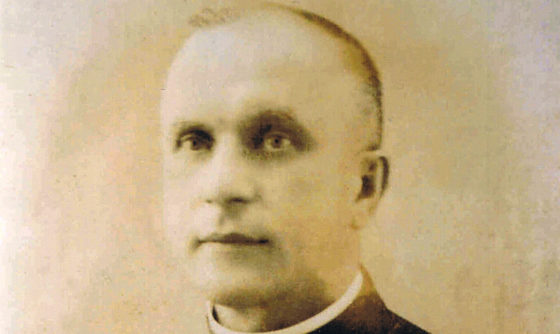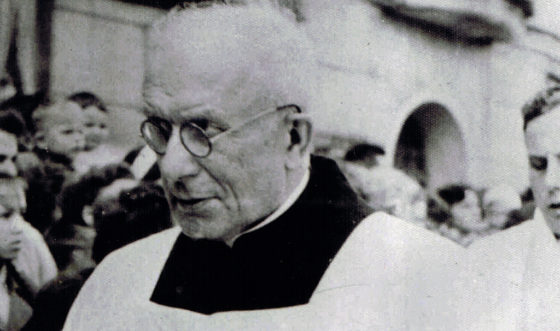The following priests supported Sister Faustina in discerning and fulfilling the prophetic mission of Mercy: in Vilnius the Blessed Rev. Michael Sopoćko was her confessor and spiritual director, whereas in Cracow it was Father Joseph Andrasz, SJ.
The Blessed Rev. Michael Sopoćko
In June 1933, Rev. Michael Sopoćko met Sister Faustina Kowalska for the first time. It was in Vilnius, where he was the regular confessor of the Congregation of the Sisters of Our Lady of Mercy. “At the very beginning she told me that she knew me because of a vision. She also told me that I was to be her spiritual director, who was to fulfil some of God’s plans which were to be conveyed by her“ – he recalled years later. Rev. Sopoćko was Sister Faustina’s confessor and spiritual director till 21 March 1936, that is, till she left Vilnius. Later he corresponded with her a lot and, in this way, he gave her advice and directions for her spiritual life and the fulfilment of the mission, while when he was in Cracow he visited her in the convent or in the hospital in Prądnik. At his command, Sister Faustina started to write “the Diary”. He was the person who took care of painting the first image of the Merciful Jesus in Vilnius in 1934 and of the public veneration, which took place during the celebrations of the Jubilee Year of the Redemption on 26-28 April 1935 in Ostra Brama (the “Dawn Gate”). Still before World War II he made efforts to get the Church authorities to institute the Feast of Divine Mercy. He wrote a number of works on the truth of the Divine Mercy. Till the end of his life he strove for the institution of the feast and approval of the Divine Mercy worship.
He was born in Juszewszczyzna, in Oszmiański district, on 1st November 1888. In 1910 he entered the Seminary in Vilnius. In 1914 he was ordained and for four years he worked as a curate in Taboryszki. In 1919-1924 he was a chaplain in the army in Warsaw and, at the same time, he did specialist studies at the University of Warsaw’s Faculty of Theology and at the Institute of Education. In 1924 he was moved to Vilnius, where, till 1932, he served as a chaplain in the army. Since 1928 he was employed as an assistant professor in pastoral theology at the Faculty of Theology of Stefan Batory University. In 1927-1932 he served as a spiritual director in the Vilnius Seminary. In 1947 he came to Białystok and from that time till 1962 he gave lectures in the Seminary. It is astonishing how diverse his ministry was: he was a parish priest, a religious education teacher, he organized educational courses, served as a teacher, a lecturer in the University and the Seminary, a spiritual director, a confessor of seminarians, priests, and nuns. He was also a chaplain in the army, an activist who promoted sobriety and a builder of churches.
He died in Białystok on 15 February 1975. In 1987 the diocesan process towards the beatification of Rev. Sopoćko was inaugurated and in 1993 the acts of the case were handed over to the Congregation for the Causes of Saints in Rome. In 2004 Holy Father John Paul II promulgated a decree on the heroic virtues of the Servant of God and then a decree regarding a miracle attributed to his intercession. He was beatified in Białystok on 28 September 2008 and his relics repose in the Divine Mercy church in Białystok, which has been raised to the rank of a diocesan sanctuary.

















